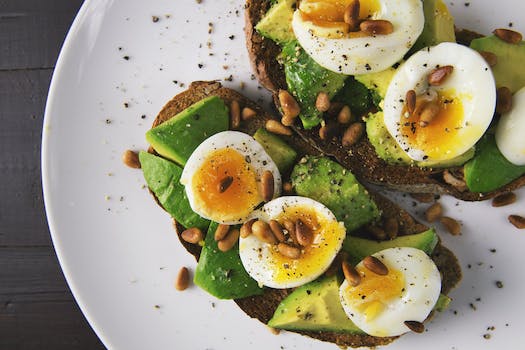
Many people believe that adopting a gluten-free diet can help with weight loss. However, it’s important to understand the relationship between gluten and weight before making any assumptions. In this article, we will explore the potential benefits and drawbacks of eating gluten-free for weight management.
- 1. Introduction
- 1.1. Understanding gluten
- 1.2. The gluten-free diet
- 1.3. Link between gluten and weight gain
- 1.4. Importance of weight loss
- 1.5. Objective of the article
- 2. The Gluten-Free Diet
- 2.1. What is a gluten-free diet?
- 2.2. Foods to avoid
- 2.3. Gluten-free alternatives
- 2.4. Benefits of a gluten-free diet
- 2.5. Challenges of following a gluten-free diet
- 3. Does Going Gluten-Free Help with Weight Loss?
1. Introduction
Gluten-free diets have become increasingly popular in recent years, with many people adopting this eating plan for various reasons. One common belief is that a gluten-free diet can help with weight loss. However, it is important to understand the relationship between gluten and weight before making any assumptions. In this article, we will explore the connection between a gluten-free diet and weight loss, examining the potential benefits and drawbacks.
1.1. Understanding gluten
Gluten is a protein commonly found in grains such as wheat, barley, and rye. It gives elasticity to dough and helps it rise during baking. While gluten is harmless for most people, some individuals have a condition called gluten intolerance or celiac disease. For them, consuming gluten can cause severe digestive problems and damage to the small intestine.
Gluten-free diets have gained popularity in recent years, not only among those with celiac disease but also among individuals seeking to lose weight. The idea behind a gluten-free weight loss plan is that by eliminating gluten from the diet, one can reduce inflammation, improve digestion, and promote overall health.
However, it’s important to note that going gluten-free does not automatically guarantee weight loss. Many gluten-free products are processed and may contain higher levels of sugar, fat, and calories compared to their gluten-containing counterparts. Therefore, it’s crucial to make informed choices and prioritize whole, unprocessed foods when following a gluten-free diet for weight management.
In conclusion, understanding gluten and its implications is essential for those considering a gluten-free diet for weight loss. While it can be beneficial for individuals with celiac disease or gluten intolerance, it’s crucial to be mindful of the nutritional value of gluten-free products to achieve weight loss goals effectively.
1.2. The gluten-free diet
The gluten-free diet has gained significant popularity in recent years, with many people adopting it as a way to improve their health and possibly even lose weight. While the diet was originally developed for individuals with celiac disease, an autoimmune disorder that causes an adverse reaction to gluten, it has now become a trendy choice for those looking to shed some pounds. This article will explore the concept of a gluten-free diet and its potential effects on weight loss.
1.3. Link between gluten and weight gain
Gluten, a protein found in wheat, barley, and rye, has been a topic of much discussion in recent years. While gluten is harmless for most individuals, there is a growing trend of people adopting a gluten-free diet for various reasons. One of the common beliefs associated with a gluten-free diet is its potential for weight loss. However, the link between gluten and weight gain is not as straightforward as it may seem. This article aims to explore the relationship between gluten and weight gain, shedding light on whether eating gluten-free can truly help in losing weight.
1.4. Importance of weight loss
Losing weight is a common goal for many individuals, and it is often associated with improved health and increased self-confidence. However, with the rise in popularity of gluten-free diets, people have started to wonder if eliminating gluten from their meals can aid in weight loss. This article will explore the importance of weight loss and whether or not eating gluten-free can help achieve this goal.
1.5. Objective of the article
The objective of this article is to explore the relationship between eating gluten-free and weight loss. It aims to provide information and insights on whether following a gluten-free diet can be an effective strategy for losing weight. By examining relevant research and discussing the impact of gluten on the body, this article seeks to inform readers about the potential benefits and considerations of adopting a gluten-free lifestyle for weight management.
2. The Gluten-Free Diet
The gluten-free diet has gained popularity in recent years, with many people adopting it as a means to lose weight. Gluten is a protein found in wheat, barley, and rye, and some individuals may have a sensitivity or intolerance to it. However, it is important to note that going gluten-free does not guarantee weight loss.
While eliminating gluten from your diet can lead to weight loss for some individuals, it is not solely due to the absence of gluten. Many gluten-containing foods, such as bread, pasta, and baked goods, are high in carbohydrates and calories. By cutting out these foods, you may naturally consume fewer calories, leading to weight loss.
Additionally, some individuals may experience bloating or digestive issues when consuming gluten, and eliminating it from their diet can alleviate these symptoms. However, if you do not have a gluten intolerance, there is no scientific evidence to support the claim that a gluten-free diet directly promotes weight loss.
If you are considering a gluten-free diet for weight loss, it is essential to ensure you still consume a balanced and nutritious diet. Focus on incorporating whole, unprocessed foods such as fruits, vegetables, lean proteins, and healthy fats. Be cautious of gluten-free products that are often highly processed and may contain added sugars and unhealthy fats.
In conclusion, while a gluten-free diet may lead to weight loss for some individuals, it is not a guaranteed solution. It is crucial to approach it with caution and make informed choices to maintain a healthy and balanced diet.
2.1. What is a gluten-free diet?
A gluten-free diet is a dietary approach that excludes the protein gluten. Gluten is commonly found in grains such as wheat, barley, and rye. Individuals with celiac disease, non-celiac gluten sensitivity, or wheat allergy follow a gluten-free diet to manage their conditions. The primary purpose of a gluten-free diet is to eliminate symptoms such as gastrointestinal issues, fatigue, and skin problems that may arise from consuming gluten-containing foods. However, it is important to note that a gluten-free diet is not specifically designed for weight loss purposes, but rather for managing gluten-related health conditions.
2.2. Foods to avoid
When following a gluten-free diet, there are certain foods that should be avoided. These foods contain gluten, a protein found in wheat, barley, and rye. For individuals with gluten sensitivity or celiac disease, consuming gluten can lead to various health issues. Here are some common foods to avoid on a gluten-free diet:
1. Wheat-based products: This includes bread, pasta, crackers, and cereal made from wheat flour.
2. Barley and rye: Foods like barley soup, rye bread, and certain types of beer should be avoided.
3. Processed foods: Many processed foods contain hidden sources of gluten, such as sauces, dressings, and processed meats.
4. Baked goods: Cookies, cakes, pastries, and other baked goods often contain gluten due to the use of wheat flour.
5. Gluten-containing grains: Avoid consuming products made from grains like spelt, kamut, and farro, as they contain gluten.
6. Some condiments: Certain condiments, like soy sauce and malt vinegar, may contain gluten. It’s important to check labels or choose gluten-free versions.
By avoiding these foods, individuals can adhere to a gluten-free diet and potentially improve their overall health and well-being.
2.3. Gluten-free alternatives
The Gluten-Free Diet is a popular choice for many individuals who have celiac disease or gluten sensitivity. However, it has also gained attention as a potential weight-loss strategy. While following a gluten-free diet may lead to weight loss for some people, it is important to choose gluten-free alternatives wisely to ensure a balanced and nutritious diet.
There are several gluten-free alternatives available that can help individuals maintain a healthy weight while following a gluten-free lifestyle. These alternatives include:
1. Whole grains: Replace gluten-containing grains like wheat, barley, and rye with gluten-free whole grains such as quinoa, brown rice, millet, and buckwheat. These grains are not only nutritious but also rich in fiber, which can promote feelings of fullness and aid in weight management.
2. Legumes: Incorporate legumes into your diet as they are naturally gluten-free and provide a good source of plant-based protein. Examples include lentils, chickpeas, black beans, and soybeans. Legumes can help you feel satisfied and may contribute to weight loss when consumed as part of a balanced diet.
3. Fruits and vegetables: Increase your intake of fruits and vegetables as they are naturally gluten-free and low in calories. They provide essential vitamins, minerals, and antioxidants, which are important for overall health. Including a variety of colorful fruits and vegetables in your diet can support weight loss efforts.
4. Lean proteins: Opt for lean sources of protein that are gluten-free, such as poultry, fish, eggs, and tofu. These protein sources can help build and maintain muscle mass, which is crucial for weight management. Including protein in your meals can also help you feel full for longer periods.
5. Healthy fats: Incorporate healthy fats into your gluten-free diet by consuming foods like avocados, nuts, seeds, and olive oil. These fats provide energy, support brain function, and help you feel satisfied. Including small amounts of healthy fats in your meals can contribute to weight loss.
It is important to note that simply following a gluten-free diet does not guarantee weight loss. Weight loss occurs when there is a calorie deficit, meaning you consume fewer calories than you burn. Therefore, portion control and overall calorie intake are still important factors to consider when trying to lose weight on a gluten-free diet.
Before making any significant changes to your diet, it is advisable to consult with a healthcare professional or registered dietitian who can provide personalized advice and guidance based on your individual needs and goals.
2.4. Benefits of a gluten-free diet
There are several benefits of following a gluten-free diet. Firstly, it can help improve digestive health. Individuals with gluten sensitivity or celiac disease often experience gastrointestinal discomfort and inflammation when consuming gluten. By eliminating gluten from their diet, these individuals can alleviate symptoms such as bloating, gas, and diarrhea.
Secondly, a gluten-free diet can promote weight loss. Many processed foods that contain gluten are high in calories, sugar, and unhealthy fats. By cutting out these processed foods, individuals on a gluten-free diet often consume fewer calories and make healthier food choices, leading to weight loss.
Additionally, a gluten-free diet can be beneficial for individuals with certain medical conditions. People with celiac disease must strictly avoid gluten to prevent damage to their small intestine. Moreover, some individuals with non-celiac gluten sensitivity may also experience various symptoms like fatigue, joint pain, and headaches, which can improve when following a gluten-free diet.
Besides the health benefits, a gluten-free diet can also provide individuals with an opportunity to explore and discover new foods. It encourages people to try alternative grains and ingredients like quinoa, buckwheat, and almond flour, which can add variety to their diet and expand their culinary horizons.
In conclusion, a gluten-free diet offers numerous benefits, including improved digestive health, weight loss, relief from symptoms associated with certain medical conditions, and the opportunity to explore new foods. However, it is important to note that a gluten-free diet is not suitable for everyone and should only be followed if medically necessary or recommended by a healthcare professional.
2.5. Challenges of following a gluten-free diet
Following a gluten-free diet can pose several challenges for individuals. One of the main difficulties is the limited food options available. Many commonly consumed foods contain gluten, such as bread, pasta, and baked goods. This means that individuals following a gluten-free diet need to carefully read food labels and find suitable alternatives for these staple items. Moreover, dining out or eating at social gatherings can also be challenging, as it requires careful communication with the restaurant staff or hosts to ensure that the meals are prepared without any gluten-containing ingredients. Additionally, maintaining a gluten-free diet can be expensive, as gluten-free products tend to be pricier than their gluten-containing counterparts. Lastly, individuals following a gluten-free diet may face difficulties in getting all the necessary nutrients, as some gluten-free products may lack certain vitamins and minerals that are commonly found in gluten-containing grains. Overall, adhering to a gluten-free diet requires careful planning, label reading, and may present various challenges in terms of food choices, social situations, cost, and nutrient intake.
3. Does Going Gluten-Free Help with Weight Loss?
Going gluten-free has become a popular trend in recent years, with many people believing that it can help with weight loss. However, the relationship between a gluten-free diet and weight loss is not as straightforward as it may seem.
Gluten is a protein found in wheat, barley, and rye. People with celiac disease or gluten sensitivity need to avoid gluten to prevent adverse health effects. However, for individuals without these conditions, eliminating gluten from their diet may not necessarily lead to weight loss.
Some individuals may experience weight loss after adopting a gluten-free diet, but this can often be attributed to other factors. When going gluten-free, people tend to eliminate processed foods that are high in calories and replace them with whole foods such as fruits, vegetables, and lean proteins. This shift towards a healthier diet, rather than the absence of gluten itself, is what contributes to weight loss.
It is important to note that gluten-free products are not necessarily healthier or lower in calories. In fact, many gluten-free alternatives such as bread, pasta, and baked goods can be higher in calories and sugar compared to their gluten-containing counterparts. Therefore, simply switching to gluten-free options without considering their nutritional value may not lead to weight loss.
In conclusion, going gluten-free can potentially aid in weight loss, but it is not a guaranteed solution. It is essential to focus on overall dietary patterns, incorporating whole foods, and maintaining a balanced caloric intake. Consulting with a healthcare professional or registered dietitian can provide personalized guidance on the best approach to weight loss.
3.1. Weight loss and gluten sensitivity
Weight loss and gluten sensitivity are two topics that often intersect in conversations about health and nutrition. Many people wonder if going gluten-free can help with weight loss. While some individuals may experience weight loss when eliminating gluten from their diet, it’s important to understand the connection between gluten and weight before making any assumptions.
Gluten is a protein found in wheat, barley, and rye. It is commonly associated with celiac disease, an autoimmune disorder that causes the body to react negatively to gluten. People with celiac disease often experience weight loss as a result of their body’s inability to properly absorb nutrients from food.
However, for individuals without celiac disease or gluten sensitivity, going gluten-free may not necessarily lead to weight loss. In fact, many gluten-free products on the market today are highly processed and may contain added sugars and fats to enhance flavor and texture. These products can be equally high in calories compared to their gluten-containing counterparts.
Additionally, when people go gluten-free, they often eliminate a variety of foods from their diet, including bread, pasta, and other carbohydrate-rich options. This reduction in carbohydrate intake can lead to weight loss initially, but it’s important to note that weight loss achieved through restrictive diets is often temporary.
The key to successful and sustainable weight loss lies in adopting a well-rounded, balanced diet that includes a variety of nutrient-dense foods. Rather than solely focusing on eliminating gluten, it is recommended to prioritize whole, unprocessed foods, increase fruit and vegetable intake, and engage in regular physical activity.
In conclusion, while some individuals with gluten sensitivity or celiac disease may experience weight loss when going gluten-free, it is not a guaranteed solution for everyone. The focus should be on overall dietary and lifestyle changes to achieve long-term weight loss and optimal health.
3.2. Reduced calorie intake
Reduced calorie intake is often associated with weight loss. When it comes to going gluten-free, it is important to understand that eliminating gluten from your diet does not necessarily guarantee weight loss. While some people may experience weight loss after adopting a gluten-free diet, it is not solely due to the absence of gluten. Instead, it is mainly because they are reducing their overall calorie intake.
Gluten is a protein found in wheat, barley, and rye, and it is commonly found in many processed foods. By eliminating gluten-containing foods, individuals may inadvertently eliminate high-calorie, processed foods from their diet. This reduction in calorie-dense processed foods can contribute to weight loss.
However, it is important to note that there are many gluten-free alternatives available in the market, such as gluten-free bread, pasta, and snacks, which can be just as high in calories as their gluten-containing counterparts. Therefore, simply replacing gluten-containing foods with gluten-free alternatives may not lead to weight loss if the overall calorie intake remains the same.
If you are considering a gluten-free diet for weight loss purposes, it is crucial to focus on consuming a balanced diet that includes a variety of nutrient-rich foods. Incorporating plenty of fruits, vegetables, lean proteins, and whole grains (that are naturally gluten-free, like quinoa or rice) can help you achieve weight loss goals while still providing essential nutrients.
In conclusion, going gluten-free can potentially contribute to weight loss if it leads to a reduction in calorie intake. However, it is not a guaranteed weight loss solution in itself. It is important to approach a gluten-free diet with a focus on overall calorie reduction and the inclusion of nutrient-rich foods.
3.3. Increased nutrient absorption
A gluten-free diet has gained popularity in recent years, with many people adopting this eating plan for various reasons. One common belief is that going gluten-free can aid in weight loss. However, it is important to understand the relationship between gluten and weight loss to determine if this dietary approach is effective.
Gluten is a protein found in wheat, barley, and rye. People with celiac disease, an autoimmune disorder, must strictly avoid gluten as it can cause severe health issues. Additionally, individuals with non-celiac gluten sensitivity may experience digestive discomfort when consuming gluten.
While gluten-free diets are crucial for those with celiac disease or gluten sensitivity, it does not necessarily guarantee weight loss for everyone. Some individuals may experience weight loss on a gluten-free diet due to better nutrient absorption.
Gluten can cause inflammation in the gut lining of individuals who are sensitive to it. This inflammation can hinder the absorption of essential nutrients from food. When these individuals eliminate gluten from their diet, their gut health improves, allowing for better nutrient absorption.
Improved nutrient absorption can lead to increased energy levels and overall better health. When the body receives adequate nutrients, it can function optimally, potentially resulting in weight loss for some individuals. However, it is important to note that weight loss is not guaranteed solely by eliminating gluten.
A gluten-free diet should be approached with caution, especially for individuals who do not have celiac disease or gluten sensitivity. It is essential to ensure that the necessary nutrients are still obtained from other sources when eliminating gluten-containing foods. Consulting with a healthcare professional or registered dietitian can provide personalized guidance on how to adopt a gluten-free diet while maintaining a balanced and nutritious eating plan.
3.4. Effect on gut health
Going gluten-free has become a popular trend in recent years, with many people adopting this diet in an attempt to lose weight. However, the connection between gluten-free eating and weight loss is not as straightforward as it may seem. While some individuals may experience weight loss when eliminating gluten from their diet, this is not solely due to the absence of gluten itself. Instead, it is often a result of other factors associated with a gluten-free lifestyle.
One potential effect of going gluten-free on gut health is improved digestion. Some individuals may have a sensitivity or intolerance to gluten, which can lead to digestive issues such as bloating, gas, and discomfort. By eliminating gluten from their diet, these individuals may experience relief from these symptoms, which can indirectly contribute to weight loss. When the gut is functioning optimally, nutrients are absorbed more efficiently, and the body is better able to regulate weight.
Another aspect of gut health that can be affected by a gluten-free diet is the balance of gut bacteria. The gut microbiome plays a crucial role in various aspects of health, including metabolism and weight regulation. Studies have shown that a gluten-free diet can alter the composition of gut bacteria, potentially leading to changes in weight. However, it is important to note that these effects may vary from person to person, and more research is needed to fully understand the relationship between gluten-free eating, gut health, and weight loss.
In conclusion, while going gluten-free may result in weight loss for some individuals, it is not a guaranteed solution for everyone. The effects on gut health, including improved digestion and potential changes in gut bacteria, can indirectly contribute to weight loss. However, it is essential to approach a gluten-free diet with caution and seek guidance from a healthcare professional or registered dietitian to ensure proper nutrition and overall health.
3.5. Importance of balanced diet and exercise
A balanced diet and regular exercise are crucial for maintaining a healthy weight and overall well-being. While going gluten-free has gained popularity in recent years, it is important to understand that eliminating gluten from your diet may not directly lead to weight loss.
Gluten is a protein found in certain grains like wheat, barley, and rye. People with celiac disease or gluten sensitivity need to avoid gluten to prevent adverse health effects. However, for individuals without these conditions, following a gluten-free diet is unnecessary and may even be detrimental to their health.
Some people may experience weight loss after going gluten-free, but this is usually due to the elimination of processed foods that contain gluten rather than the absence of gluten itself. Many processed gluten-free products are high in sugar, unhealthy fats, and calories, which can contribute to weight gain.
To achieve weight loss, it is important to focus on creating a calorie deficit by consuming fewer calories than you burn through physical activity. This can be achieved by following a balanced diet that includes a variety of whole foods such as fruits, vegetables, lean proteins, whole grains, and healthy fats. Exercise plays a crucial role in weight management as it helps burn calories, build muscle, and improve overall fitness.
In conclusion, while a gluten-free diet may be necessary for individuals with celiac disease or gluten sensitivity, it is not a guaranteed solution for weight loss. Instead, a balanced diet that includes all food groups and regular exercise is key to achieving and maintaining a healthy weight.
Conclusion
In conclusion, while a gluten-free diet may be necessary for individuals with celiac disease or gluten sensitivity, there is no scientific evidence to support the claim that eating gluten-free alone can lead to weight loss. It is important to focus on a balanced and nutritious diet, regular exercise, and overall healthy lifestyle habits for sustainable weight management.


